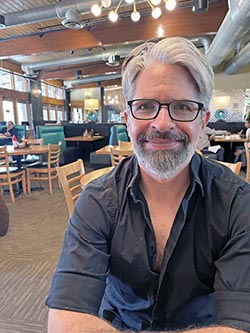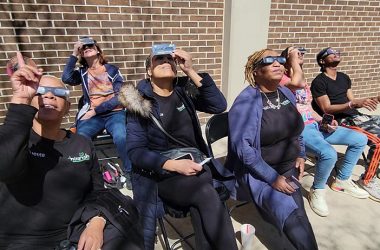
(This story is part of the Chronicle’s State of Faith series exploring spiritual life in the Homewood and Flossmoor area. The Chronicle spoke with the newly appointed pastor at a mainline church to find out how he will approach his position. The project is funded by a grant from the Homewood Rotary.)
Pastor Matt Lang stood in front of the congregation at First Presbyterian Church in Homewood during his invocation service, wearing a Macho Man Randy Savage Christmas sweater. He talked to the parishioners about the fact that he has attention deficit disorder.
“The point was that I have ADD, and I try to embrace it as a gift,” Lang said. “But if it is a gift, it feels like an ugly sweater — fun and amusing, but it’s a lot to deal with every day. There’s a lot going on.”
Lang works in an arrangement in which he spends half of his time with First Presbyterian and half serving as pastor at Calvary United Protestant Church in Park Forest.

Presbyterian Church in Homewood, sat
down at Grady’s Snack ‘N Dine for lunch
and a discussion of his vision for the
future. (Carole Sharwarko/H-F Chronicle)
We’re focusing on First Presbyterian for this article. Can you describe some aspects of a typical service there?
Scripture is central to how the worship is structured. We start with the scripture, and everything flows from it and flows to it. We don’t have a literal interpretation, however. The Bible is a collection of stories written by humans.
We sing hymns from a hymn book. There’s organ and piano, played by a phenomenal musician.
The preaching is not dynamic or charismatic. It’s very traditional. Within that, there’s a lot of room for kind of a conversation: “Here’s what I’m thinking about this scripture. Here’s what this has to say to us; here’s how it’s showing up in conversation with the world around us. Let me give you some tools you can use to think about it.”
Among those tools can be skepticism or confusion or anger. Scripture invites us to bring our whole selves to the conversation. We don’t have to simply accept it and move on. We can say, “I don’t really like this, and I have a lot of questions.”
It’s formal in the structure of the service, but within that, it’s conversational and accessible.
Presbyterians, although we put worship in the center, we’re also very clear that we don’t worship the Bible. The Bible points us in the direction, but we worship God in the person of Jesus Christ.
What atmosphere would a person encounter visiting a Sunday service for the first time?
The congregation is representative of Homewood in how they welcome you. They are broadly longtime Homewood residents who know and love the community, who are in support of the community. They are happy to have someone who wants to meet them in that place.
If anything, they might err on the side of being too welcoming, especially if you’re an introverted person.
Some people are more formal, while others are more casual in dress. You’ll see everything from suits to shorts and T-shirts.
What we have to offer, in a world of anxiety in which life seems precarious, is an actual sanctuary. We are not afraid of the churn and the tumult around us. Not that we’re ignoring it; we’re very much engaged with it. We’re a place that, within that, can offer steadiness in the world.
If I put myself in the shoes of a hypothetical person out there who doesn’t have a church or any kind of organized religion or civic group, a person who was looking for something, what I would find at Homewood Presbyterian would be this place of rest and recovery, and an alternative to the noise of the world.
The church is experiencing a similar decline in membership common among many houses of worship these days. Does this concern you?
Growth is (society’s) idol. Growth is the god the whole world chases. Churches get caught up in that feeling of, “We have to grow!” Maybe we don’t. It’s nice to grow, but that’s also anxiety-producing. A church can try to keep up with that and chase it. What if we pursue a different path where you can rest from that, not chasing anything, but relating to each other?
A vital aspect of the congregational church is the intergenerational relationship of people. I don’t know of other organizations that facilitate intergenerational relationship building like the church does. When I do worry, I worry if we lose the church and congregational worship as it exists now, we lose another area to interact and build relationships intergenerationally.
What goals do you have for the church and its parishioners?
I’m not attached to any particular outcome for the church. My wish is to not worry. What I want for the church is to worry less and to live more, to rest in God’s abundance.




